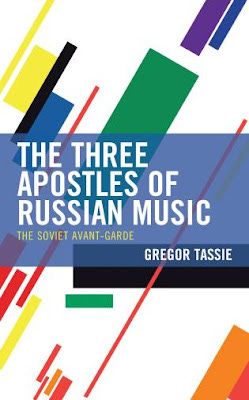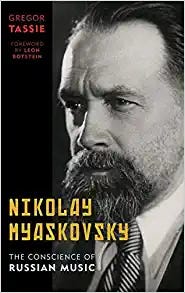Gregor Tassie on past and current Russian composers
On Popov, Roslavets, Mosolov and many more
Gregor Tassie is the author of The Three Apostles of Russian Music, a new book which is, as far as I can tell, the only book that gives Gavriil Popov, Alexander Mosolov and Nikolai Roslavets their due. The variety and depth of his research is impressive; see my review. He also is the author of Nikolay Myaskovsky: The Conscience of Russian Music, Yevgeny Mravinsky: The Noble Conductor and Kirill Kondrashin: His Life in Music. Do you see a theme here? If you have any real interest in Russian classical music, you have to pay attention to Mr. Tassie. He also regularly pens articles for Musical Opinion, Classical Record Collector, and Gramophone and has been a consultant for BBC Radio and for documentaries.
After I read The Three Apostles of Russian Music, I had some questions, which I urgently hoped Mr. Tassie would answer. He replied!
RUSSIAN FUTURISM: How did you choose the three composers you decided to focus your book upon? GREGOR TASSIE: I have been interested in 20th-century music from my earliest years, and rather than an attraction to classical composers such as Mozart and Beethoven, my interest was guided by my first teacher John Maxwell Geddes who was an avant-garde composer. My favourites were Bartok, Shostakovich, Hindemith, Stravinsky, Britten et al. That was in the late sixties and there was virtually little available on radio, record or concert performances of Shostakovich, and the more I heard about Shostakovich, the more I became interested in his contemporaries in Russia. Myaskovsky was one I was drawn to for the originality of his voice ranging from late-romanticism to modernism, his early sonatas are exceptional, and his 10th symphony is certainly different from anything his contemporaries were writing, (with hints of Schoenberg, but then Myaskovsky had reviewed his first works in the 1910s) except for some of his pupils, namely Mosolov, Shebalin and Kabalevsky. Eventually, I heard Roslavets when his works were played here in Glasgow by the BBC SSO in the late 1980s, it was clear that he possessed an original voice, unlike any other Russian composer. Popov was a close friend of Shostakovich, yet most of his music is for the cinema, when his 1st symphony was released on Olympia it seemed as if this was one of the great 'lost' symphonies of the 20th century, sadly his symphonies are never played. Mosolov in a short period of time after he enlisted at the conservatoire, was a revolutionary composer whose sonatas, and orchestral pieces charted a path similar to the young Prokofiev yet he embraced industrialism and the shocking new age of music, there is irony, and parody far more than other composers of the period, yet as he matured his voice changed despite retaining a brilliance in expression, through to the 6os he was an exciting composer. I decided to write about these three composers after my book on Myaskovsky and after paying my 'debt' to Myaskovsky, through Myaskovsky I discovered much more about the period in which avant-garde music was born and written and sometimes performed, more often not performed. Popov, Roslavets and Mosolov were three composers who shared a period in time and each was quite different from the other. They all had different 'voices' and their story and their creativity needed to be told, in the course of my research I discovered other composers; Shillinger, Matyushin and Lourie who I found space for in my final chapter.
RUSSIAN FUTURISM: Is there a still-unrecorded work by Roslavets, Popov or Mosolov which you would particularly like to be recorded? GREGOR TASSIE: Thankfully, much of Roslavets' chamber music is recorded, yet we need more recordings of his violin concertos, however, it would be great if someone could record his early The Heaven and Earth based on Byron, also his symphonic poem Komsomilya, they represent different periods; from his student years and the end of the 1920s when he was changing somewhat in style embracing socialist realism. In the case of Mosolov, it would be terrific if a recording of his opera The Dam was made, if anyone could see the Youtube performance, they would realise what a terrific revelatory piece it is. Popov was tragically ignored but we need a recording of his Fourth Symphony 'Choral' which is the only symphony still unrecorded.
RUSSIAN FUTURISM: Many different piano players have tackled piano works by the three composers you write about; is there a pianist you particularly like?
GREGOR TASSIE: Marc-Andre Hamelin is a great interpreter of avant-garde and modernist composers with impeccable technique, whilst of the Russians, Yuri Favorin has also championed the avant-garde and has made recordings and continues to specialise in this avenue of music, I would like to see Maria Lettburg playing this music, she has a great technique and is well suited in tackling the technical difficulties of this music and would be an admirable propagandist for the Russian avant-garde school.
RUSSIAN FUTURISM: Can you say something about your current book project?
GREGOR TASSIE: When I write my books, I always try to find a subject little-known or neglected, and to date, I am astonished there is no monograph about Sergey Taneyev - Tchaikovsky's leading pupil, and the teacher of Scriabin, and Rachmaninov and who wrote a huge amount of music for piano, chamber, symphonic, choral and opera. Several of his works are quite exceptional, certainly, the Fourth Symphony in C minor deserves to be among the great Russian symphonies such as Rachmaninov, Borodin and Tchaikovsky. Several of his chamber pieces, the quartets, and the piano quintet are masterpieces of their kind, his choral pieces are among the greatest Russian works, notably his At the Reading of a Psalm, John of Damascus, and his opera Oresteia is the most neglected great Russian opera. Apart from this he was a great teacher and premiered much of Tchaikovsky's music both as a pianist and conductor and he staged the premiere of Eugen Onegin when he was rector of the Moscow Conservatoire. He was a great interpreter of Mozart and of Bach, he restored much of Bach's music to Russia for performance and researched musical technique, and wrote several books on polyphony and music of the Renaissance. He travelled widely in Europe and spent much time in Paris where he associated with many of the great French composers, Saint-Saens, Franck and D'indy, and the writer Turgenev. He enjoyed a friendship with Tolstoy, he also taught Stanchinsky, an outstanding young composer who sadly died young. Taneyev himself died young at the age of only 59. I began researching Taneyev just before the pandemic so much of my work has been online, and sadly it is still almost impossible to travel to Russia to study his archives because of the war. Hopefully, it may be possible to visit later this year for an extended visit.
RUSSIAN FUTURISM: Which currently living (or recently dead) Russian composers should we be listening to?
GREGOR TASSIE: I would first mention the recently deceased Kancheli (if you permit me to mention one who was from the Soviet school), he wrote outstanding symphonies, and of the living, Gubaidulina who has managed to enjoy success in recent years, and has a fascinating voice and means of expression, still at her age of 91, is writing outstanding music. Vustin and Tarnopolsky are important contemporary Russian composers who have interesting ideas and could be said to be the 'current' avant-garde in Russia. Alexander Tchaikovsky is a very good composer, and I should mention Slonimsky and Tischenko who are extraordinary composers who need to be heard in the West, nevertheless, I consider Rodion Shchedrin to be the finest living Russian composer. The Russian composing school is immensely rich and sadly we still know little about contemporary Russian composers.
RUSSIAN FUTURISM: Can you offer a couple of listening suggestions for Kancheli and Shchedrin?
GREGOR TASSIE: I would suggest Kancheli's seven symphonies, certainly his Fourth and Fifth are excellent works, very individual and dramatic works, also Mourned by the Wind, a liturgy for viola and orchestra, and his A Life without Christmas in which each movement has solo parts for viola, soprano, full orchestra and string quartet, and his Light Sorrow for children's choir and orchestra. For Shchedrin I would recommend his Carmen Suite a brilliant orchestrated adaptation from Bizet, the five Concertos for Orchestra, the Third Piano Concerto, The Sealed Angel for chorus, his opera Dead Souls, Polyphonic Notebook for piano, and there is much else in his huge catalogue of music, his music ranges from aleatoric, folk music, jazz and serial influences all brilliantly written. Both composers have enjoyed success in US orchestras over the years with leading musicians premiering their works, and there are quite a few recordings available. I hope you enjoy discovering this music.





Thank you. I enjoyed this interview.